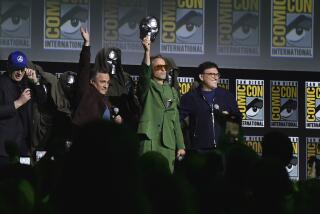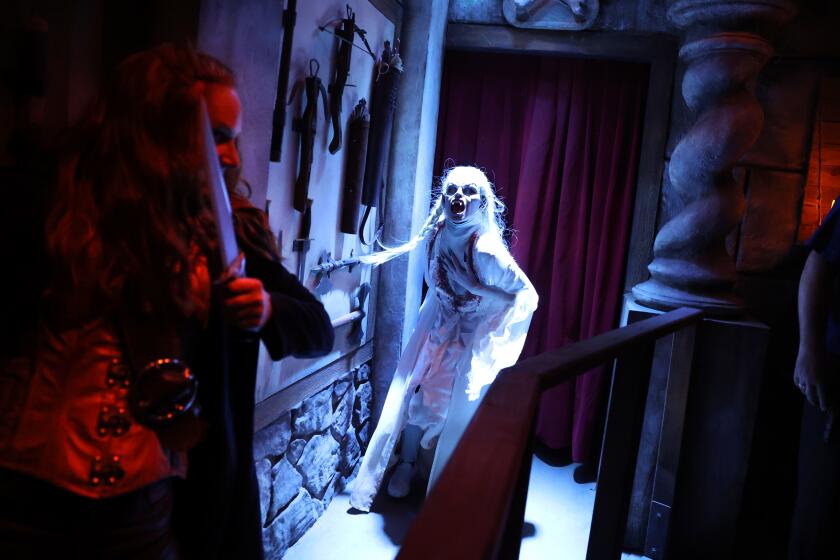Q&A: David Tennant on Marvel’s ‘Jessica Jones’ and the pains of playing a purple psychopath
Though he is known to most individuals as the Tenth Doctor from the British sci-fi classic series “Doctor Who,” audiences are about to meet a much more sinister side of David Tennant.
As the main villain in Marvel’s latest television endeavor, Netflix’s “Jessica Jones,” Tennant plays Kilgrave, a man with the power to manipulate others in a far from super fashion. The series itself follows the exploits of failed superhero Jessica Jones and her work as a private detective as she tries to manage her troubled past and tentative future, both of which Kilgrave figures into greatly.
Tennant spoke by phone to elaborate on finding humanity in the inhuman and his (temporary) disappointment at learning his character would not feature purple skin as in the show’s graphic novel source material.
What drew you to Kilgrave and to “Jessica Jones” as a project?
A combination of things. It was the fact that it was a Marvel property. I’ve always been a fan of their comic books and, more recently, I’ve been a fan of their movies and their TV shows, so that was an initial interest.
I spoke to Melissa Rosenberg, our show runner, and I spoke to Jeph Loeb, the head of Marvel TV, and I liked everything they had to say and then I read the script. Admittedly, the first few scripts, Kilgrave doesn’t really show up in, but I got a sense of how good the writing was and I got a sense of this particular world that they were creating. Everything sort of combined to be the type of project that was worth getting involved in.
How familiar with the “Alias/Jessica Jones” comics were you? Did you read up before shooting started?
I thought I knew my Marvel pretty well and I realized that I didn’t because I’d never heard of the “Alias” comic books. Partly, I suppose, because it was part of the Marvel Max imprint, which was for slightly more mature audiences and I’d never come across that before.
Of course, once I signed on, I sought it out and it’s such a great comic book. Such a great bit of storytelling in whatever form, for the way it uses the comic book form, and also the expectations of a comic book. You have Jessica Jones absolutely existing within the world of Captain America and the Avengers, yet existing in that world in such a different way. She’s not a superhero in the traditional sense. She’s almost an antihero. She’s a drunk, she’s chaotic, she’s not always particularly likable. So it’s a brilliantly created character and it’s a great graphic novel.
I prefer the term “anti-superhero.”
Yes, that’s exactly what she is. She has literally rejected being a superhero. She’s not what you would expect tuning into a Marvel show, but then I don’t think anything in this is what you’d expect. It’s certainly for an older audience than anything Marvel has done before, with the possible exception of “Daredevil,” but I think even that, I think “Jessica Jones” goes to some very dark places in psychological places as well as the content. It really explores what it would do to a person to have these powers and live with these powers and to be caught up in that world.
It’s a character piece, really, that happens to involve some characters who have extraordinary abilities, but it’s not really a superhero show. Hopefully it will find an audience that wouldn’t normally come to a Marvel show. I think it’ll please all the comic book fans and all the people who know and expect the kind of things that Marvel does, but I think it will also find a different audience.
As Kilgrave is portrayed in the graphic novels, he’s a bit of a single-minded psychopath. What do you see as Kilgrave’s dimensions on the TV show?
I think there’s something quite tragic in where he’s ended up. If you’re someone whose every word is acquiesced to, if you’ve never met any resistance in life, then your perception of reality is going to be quite skewed. You’re never going to know if someone is doing something because they wish to or because you’re telling them to. You’ll never be able to interact with people on a normal human level and that’s going to do things to your mind. That’s going to do things to the way you perceive reality and it’s going to do things to your moral compass.
To an extent, I can sympathize with Kilgrave, which always seems like a terrible thing to say, because he’s done extraordinarily ghastly things, and while I don’t condone his actions, I think I can grasp an understanding of why he’s ended up where he is.
Maybe that’s just because that’s my job and as an actor you’ve got to try to understand, at least, why the character you’re playing does the things that they do. You might not condone those actions, but you’ve got to try to at least begin the journey towards empathizing with them.
I think that makes him an interesting character. And I think there are glimpses of that in the “Alias” Kilgrave, but I think what Melissa has allowed in the way she’s written the character is that you get to glimpse his side of the story. I don’t think the show lets him off the hook, but I think we get glimpses into why he is who he is and that allows us to extend a little bit of humanity towards him. Or at least I did.
In Episodes 8 and 9 we get a little bit of Kilgrave’s back story and we do sympathize with him in flashes and that just makes the way we react to the story more complicated and, therefore, more interesting.
Are you sad that you don’t have purple skin like in the comics? Was the purple skin really considered? Did you have long conversations about whether or not this was feasible?
[Laughs.] No, it was decided before I came along that that wasn’t going to be pursued. I had a couple days before I had a proper conversation with Melissa and Jeph, wondering if that was going to be the intention and wondering how I would live with that.
I imagined it would be quite fun. At first. But it would get dull quite quickly, I imagine. By week two, I’d be thinking, “This is no longer a lark,” as I’m washing more pillowcases.
I think it was probably the right idea, but also, in that move to real world storytelling, there are certain things that aren’t going to translate from a two-dimensional comic book page in quite the way that they might. I think it was the right decision and the nods to purple are still very much there in the TV show without ever being explicitly referred to.
But I think the purple skin might have pushed it into realms of fantasy storytelling that aren’t quite appropriate for the story we’re trying to tell.
Along those same lines, Kilgrave in the graphic novel was convinced that they were stuck in a graphic novel. I imagine that has been similarly excised from the television series, as well.
There was a real meta thing going on, wasn’t there, when he started deconstructing what he was doing. Yeah, that’s not really part of our story. I think Brian Michael Bendis does that beautifully in the comic book and I’m sure there’d be a way to do something similar in the TV show, but that’s not something that we pursued. It really gets quite dark and quite unsettling.
That was something that came up time and again in speaking with Melissa, in that the way that she dealt with matters of rape and manipulation and trauma is to keep it very grounded in reality. I imagine that’s a balance that’s difficult to strike when dealing with the source material that you’re dealing with.
I think it is, yes. And they’re quite brave about the way they confront all that because you are talking about some fairly awful things. You’re talking about characters who have different perceptions of what went on and who did what to whom and who was acquiescing and who wasn’t. That’s fascinating and disturbing from a story point of view, but it’s also, we look to stories to unpack things that we find difficult to unpack in life. It’s what “Grimm’s Fairy Tales” do.
It’s a fable. The way we process these atrocities in real life is by processing them through our culture. In a lot of ways, Kilgrave’s powers render him an emotional terrorist. Does that weigh on you as an actor after awhile?
I think you’ve got to. At the end of the day, it is pretend. I’m not really torturing Krysten [Ritter], it’s Kilgrave who’s torturing Jessica, and you’ve got to understand that’s a fictional construct, otherwise you would go mad. Obviously there are some depressing scenes, but the act of acting them out can be a catharsis, rather than something that’s damaging you, hopefully.
You get to go to some dark places in your own psyche, but you’re doing that in a very safe, controlled environment, so I don’t think I took any of that home with me. I hope not. I certainly wasn’t aware that I was doing that. You’d have to ask the people around me.
They’ve collected such an outstanding ensemble for this show and yet, in the first half of the season, you primarily interact with Krysten Ritter. How did you two build that relationship and will you get a chance to interact with the rest of the cast more as the season progresses?
The first seven episodes is all they’ve shown anyone and I don’t really get going until the end of episode seven, really, which does all change at the start of Episode 8. As the story unfolds later, I do finally get to play with everyone eventually, but it’s all because of the way it relates back to Jessica. She is Kilgrave’s obsession, so that relationship was key for me.
It’s interesting, because Kilgrave is obsessed with the Jessica that he created. He’s obsessed with the Jessica that is compliant to him. And therefore he’s fascinated by the Jessica who isn’t, and that’s the Jessica he sets out to control.
In terms of how you build that relationship, in a way, you just want to play the scene. It’s so well written that the layers of who’s identifying with which version of each other, it’s so complicated, you can’t unpick it. When the writing is as good as it is, you just allow those things to play.
And when you’re working with someone like Krysten, who’s so instinctive and so in the moment and on the money with her performance, you play the scene as openly and truthfully as you can and it all makes sense.
What are you most anticipating people seeing once the season finally premieres? What are you most excited for them to discover about the show?
You sit down expecting a superhero show and actually it’s a film noir detective show, but then it’s not that either, it’s a psychological drama, and it keeps confounding you. Just when you think you know what the story’s going to be, just when you think you can predict where it’s going to go, it will confound your expectations.
I think it’s good that 13 episodes become available at one moment because I think people will be compelled to keep watching and see the story through to the end. I’m just excited for people to see the whole thing and go on that journey.
Follow me on Twitter at @midwestspitfire.
More to Read
The biggest entertainment stories
Get our big stories about Hollywood, film, television, music, arts, culture and more right in your inbox as soon as they publish.
You may occasionally receive promotional content from the Los Angeles Times.











